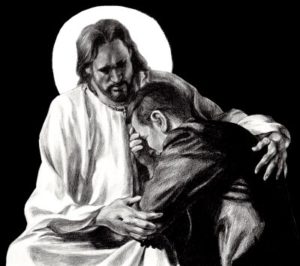The Sacrament of Reconciliation
Confession is celebrated in the Church Confessional at the below times
Every Tuesday from 11:00 a.m. to 12:00 p.m. & 3:00 to 4:00 p.m.
Every Friday from 3:00 to 4:00 p.m. & 6:00 to 7:00 p.m.
Every Saturday from 2:30-3:45 p.m.
You may also request a confession by stopping by the parish center to arrange a time with a priest.
How do I go to confession? click here
Procedure for Confession
 Begin with the sign of the Cross:
Begin with the sign of the Cross:
In the name of the Father,
+ and of the Son,
and of the Holy Spirit. Amen
Then you say:
Forgive me Father for I have sinned. It has been ___ since my last confession. These are my sins.
Then confess your sins and if possible the number of times per sin. i.e. I lied 6 times . . .
When you are finished simply say:
For these and for all my sins I cannot remember, I ask for forgiveness.
The priest will speak with you briefly and give you your Penance. After which, you to say an Act of Contrition.
O my God I am sorry to have offended You and I detest all my sins because I dread the loss of Heaven and the pains of Hell; but most of all because I have offended You, my God who are good and deserving of all my love. I firmly intend with the help of Your grace to confess my sins, do penance, and amend my life. Amen.
Theology of Reconciliation
The Sacrament of Reconciliation (also known as Confession or Penance) is the means by which Christ heals a person of wounds caused by his/her sins. This Sacrament expresses God’s desire to be in a “Holy Communion” with His people. For this to happen, each of us must freely choose to accept God’s invitation to share in His life. However, given our tendency to be self-centered, we make choices and sometimes behave in ways that are contrary to God’s law or plan. We call these sins and they lessen our relationship with God and with one another. Through Christ’s death and Resurrection, there is now the opportunity to be restored in our relationship to God.
Some other items regarding this sacrament:
- Catholics are bound to receive this sacrament at least once a year
- This sacrament may be received as often as necessary with any priest throughout the world
- Those who are conscious of any grave or mortal sin should receive this sacrament before receiving Holy Communion
- The seal of confession binds the priest to a sacred silence about an individual confession. The priest may never repeat what he hears. Many priests have gone to their death rather than break the seal of confession.
- The priest helps us to make a confession. If we are confused, unsure or simply don’t know what to say, the priest will offer assistance.
- Penitents can choose to celebrate this sacrament anonymously or face-to-face.
Reconciliation and Sacred Scripture
In the Acts of the Apostles (Acts 2: 19-23) Jesus greets the disciples in the Upper Room after the Resurrection and says to each of them “Peace be with You” then he breathes on them and says “Who sins you shall forgive they are forgiven. Who sins you shall retain, they are retained.” In this sacred moment the Apostles are commissioned to forgive sins directly from Christ. At Ordination, from a modern day apostle, the bishop of the diocese, our priests receive the same capacity to free us from all sinfulness.
The Essential Rite of Reconciliation
There are four parts to the Sacrament of Reconciliation.
- Confessing sins. The person desiring the sacrament confesses his/her sins to a priest or bishop. Part of their ministry is to be an agent of divine mercy. They hear our confession, perhaps offer some words of counsel.
- Penance. The priest will suggest some external expression of our gratitude for Gods’ mercy and intent to avoid sin. Penance may take the form of a prayer or work of charity.
- Act of Contrition. Having confessed sins, the penitent must freely express regret for the sin. The Act of Contrition may be a memorized formula or may be spoken freely from the heart.
- Absolution. After expressing sorrow, the priest prays with the penitent and in the name of Christ absolves him/her of all sin. (The priest does not confer absolution unless the first three parts are present)
